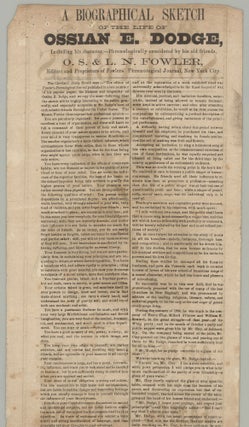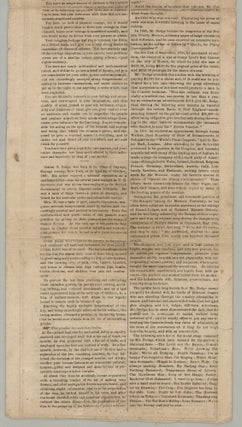Dodge’s Sociables. The Friends of Music, Harmony, Poetry, Humor, Pathos and unaffected Humanity are invited to one of Ossian E. Dodge’s Sociables, in Armory Hall, Columbus, O. Wednesday Evening, Nov. 28th, 1860.
Columbus, Ohio, 1860. Illustrated broadsheet, 21” x 5” plus margins, with portrait wood engraving signed “J. W. Orr, N.Y.” CONDITION: Good, old folds, light chipping to margins, a few poke holes at the top, top and bottom margins trimmed close to printed border. An unrecorded broadsheet promoting a satirical musical performance by the eccentric singer-songwriter Ossian E. Dodge, including a wood engraved portrait of Dodge, as well as a biographical note and phrenological “reading” of Dodge on the verso. For this engagement, Dodge was assisted by the poet and vocalist James G. Clark, who was styled “the Ballad singer of America” by leading papers of the day. The evening’s program consisted of “chaste humor, plaintive sentiment, dramatic power, unspeakable joy, agonizing grief, fervent patriotism, and religious resignation.” The program’s twelve parts include performances as: “The World would be better for it” (a reformation song); “I’m always making blunders” (descriptive of the mishaps of an overgrown youth); “Know Nothing Password” (an exposition of the “doin’s of this extensive but mysterious Order”); “A Chapter on Drawing” (a collection of puns on which the audience will, perhaps, draw comic inferences); “I’ll Do as Much Sometime for You” (illustrating “the awkward attempts of a bashful Irishman to pop the question”); “The Dying Boy” (depicting “in a beautiful manner the belief in the immorality of the soul”); “The Thanksgiving Dinner” (illustrating “a great variety of New England peculiarities”), and so forth. It is noted that Dodge would be selling high quality violin and guitar strings, as well as sheet music. Newspaper testimonials praising James G. Clark are included. It is noted that Clark was a member of Dodge’s Concert Company, Ossian’s Bards, for three years, and listed here are a number of Clark’s compositions. Admission was 25 cents, and children were admitted for 15 cents. The verso features an extensive phrenological assessment and biographical sketch of Dodge by his “old friends,” O. S. and L. N. Fowler, editors and owners of Fowler’s Phrenological Journal. Born in Cayuga, New York, Ossian Dodge (1820–1876) was a performer of his own self-penned moral, genteel, and comic songs. Initially trained as a cabinet maker, Dodge worked for a time as an ornamental painter, creator of wax flowers, and art teacher in female seminaries, before moving to New York City to pursue music, where he also began associating with political notables during the 1840s, including Henry Clay, Millard Fillmore and William H. Seward. Dodge was elected to the 1851 delegation to the International Peace Congress in London, and while in Europe he served as a foreign correspondent for his own journal the Boston Weekly Museum (est. 1849) under the alias “Quails, the Flying Correspondent.” Retiring from singing, he moved to Cleveland in 1858 where he sold music-related publications—following which he moved to St. Paul, Minnesota and worked in real estate. In time, he became secretary of the St. Paul Chamber of Commerce—a position he held between 1869 and 1873. He is reputed to have stolen the “Ultima Thule” daguerreotype of Edgar Allan Poe—which he then subsequently lost after lending it to a portrait painter. Born in Ireland, John William Orr (1815–1887) was a wood engraver who immigrated to the U.S. as a child and grew up in Buffalo, NY. In 1836 he studied with engraver William Redfield, and the following year established an engraving business in Buffalo. In 1844, he settled in New York City. From 1844 to 1846 he and his brother Nathaniel were in business together as J. W. & N. Orr. The brothers were in demand as book and magazine illustrators and ran one of the largest engraving plants in the city. Between 1862 to 1871 John Orr served as the editor and publisher of the American Odd Fellow. He died in 1887 in Jersey City, NJ. No copies recorded in OCLC. REFERENCES: Ort, Ivan. “Dodge, Ossian Euclid (1820–1876)” at The Vault at Pfaff’s, Lehigh University online; Groce, George C. and David H. Wallace, The New-York Historical Society’s Dictionary of Artists in America, 1564–1860 (Yale University Press, 1957), p. 479.
Item #8188
Price: $475.00




